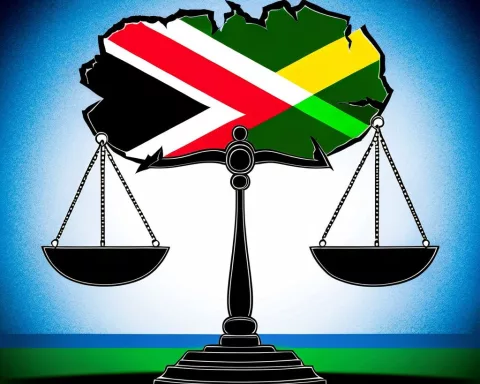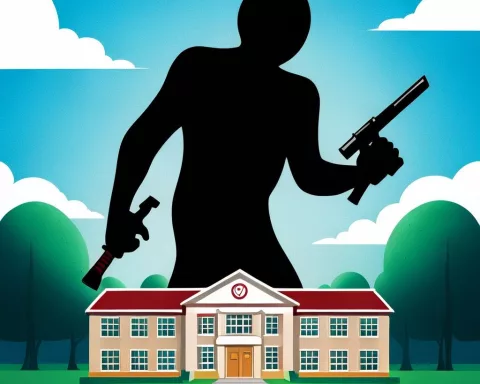Four men in South Africa, including Luyanda Lonzi and Sicelo Mase, who were previously convicted of a hate crime in 2006, have been accused of the theft and murder of Cape entrepreneur Charl Munnik. The case highlights the cycle of crime and punishment, with a history of violence dating back to the hate crime. The robbers arrived at Munnik’s shop with a manifest motive and not only took his possessions but also his gun, compounding the tragedy. The prosecution alleges premeditation and deliberate brutality, and the trial serves as a chilling testament to the persistent ramifications of crime and violence in society.
The Circle of Crime: A Journey from Hate Crime to Armed Theft
Lonzi, Mase, Ziqu, and Dotwana stand accused of the theft and homicide of Cape entrepreneur Charl Munnik. This case highlights the perpetual cycle of crime and punishment with a history of violence dating back to a hate crime in 2006. The robbery was a deliberate act of brutality, and the criminals arrived with a manifest motive. They not only took Munnik’s possessions but also his gun, compounding the tragedy.
Section 1: A Legacy of Infamy
South African crime history acknowledges the names Luyanda Lonzi and Sicelo Mase as symbols of fear. They, in concert with Awonke Ziqu and Ndyebo Dotwana, find themselves entangled once again in the harsh realities of the penal system. This time, they stand accused of the theft and homicide of Cape entrepreneur Charl Munnik, an episode that occurred after their parole. Their prior conviction was for a hate crime committed against Zoliswa Nkonyana, a 19-year-old girl, which reflects their history of violence.
In 2006, Nkonyana’s brutal murder, influenced by her sexual preference, sent shockwaves across the Western Cape. Lonzi and Mase, together with Lubabalo Ntlabathi and Mbulelo Damba, received an 18-year sentencing for the savage assault, a case that required six strenuous years to reach a conclusion.
Now, the cadre faces a plethora of accusations linked to Munnik’s case. Prominent among these are theft with heightened conditions, homicide, and control of an illicit firearm and ammunition. The prosecution’s objective is to portray a premeditated, ruthless theft that escalated into a deadly shooting on 29 January 2021, at Munnik Jewellers.
Section 2: The Crime Scene
Charl Munnik, a renowned jeweller in Worcester, was allegedly singled out by this group. They reportedly planned a robbery at his shop, which tragically ended in Munnik’s death. They are also accused of forcibly taking his belongings, a raw act of indifference recorded in frightening detail on CCTV footage.
The video, a mute, harsh witness to the horrific scene, displays two of the criminals brandishing firearms. They aggressively seized belongings from a woman at the scene, including jewellery and a cellphone. Responding courageously but tragically, Munnik, driven by his mother’s anguish, engaged the criminals with his licensed weapon. This encounter culminated in shots being fired, fatally injuring Munnik.
Section 3: The Investigation
An intriguing facet of the case is the alleged premeditation. The prosecution asserts that this wasn’t a random act of crime but a deliberate act of brutality. The criminals didn’t merely happen upon the scene, they arrived with a manifest motive. They didn’t just rob Munnik of his possessions; they also escaped with his gun, thereby compounding the tragedy.
The meticulous probe led to the capture of the accused. Lonzi and Dotwana were caught in Worcester, while Mase and Ziqu were apprehended in Lentegeur. Court records suggest that three of the alleged were identified via facial recognition and identity parade, a combination of old and new crime-solving methodologies.
Section 4: The Verdict
A moving detail that emerges from the court documents is the timeline of Lonzi and Mase’s parole. They were granted parole in 2019, which was supposed to last until 2026 and 2025 respectively. But now, they are back in custody, their trail marked by a history of violence.
This case serves as a stark representation of the perpetual cycle of crime and punishment. It is a dark tale of violence that originated in 2006, with the hate crime against Nkonyana and continues to the present with the allegations against Munnik. The saga of Lonzi, Mase, and their accomplices is a chilling testament to the persistent ramifications of crime and violence in society.
1. Who are the four men accused of armed theft and murder in South Africa?
The four men accused of armed theft and murder in South Africa are Luyanda Lonzi, Sicelo Mase, Awonke Ziqu, and Ndyebo Dotwana.
2. What was the prior conviction of Luyanda Lonzi and Sicelo Mase?
Luyanda Lonzi and Sicelo Mase were previously convicted of a hate crime in 2006, for the brutal murder of Zoliswa Nkonyana, a 19-year-old girl, which was influenced by her sexual preference.
3. What are the accusations against the four men?
The four men are accused of theft with heightened conditions, homicide, and control of an illicit firearm and ammunition, linked to the theft and homicide of Cape entrepreneur Charl Munnik.
4. What happened at Munnik Jewellers on 29 January 2021?
On 29 January 2021, the accused allegedly planned a robbery at Munnik Jewellers and ended up fatally shooting Charl Munnik while forcibly taking his belongings, including his licensed firearm.
5. How were the accused identified?
Three of the accused were identified through a combination of facial recognition and identity parade, a combination of old and new crime-solving methodologies.
6. What does this case highlight?
This case highlights the perpetual cycle of crime and punishment, with a history of violence dating back to a hate crime committed in 2006. It serves as a chilling testament to the persistent ramifications of crime and violence in society.












